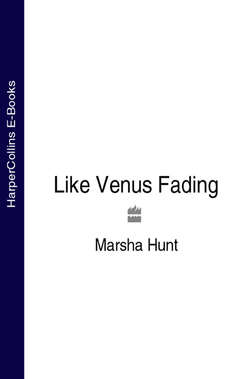Читать книгу Like Venus Fading - Marsha Hunt - Страница 13
5
ОглавлениеI don’t know why Mother and Lil weren’t enough family for me.
I don’t know why I made so much of Miss Hortense.
But I don’t want to recall what should have been, I want to look at what was … And Miss Hortense filled a need that I must have had, a need to have a fancy woman to muse upon. Maybe that’s all goddesses have ever been. Did I come into this world incomplete until I could connect with a woman whose beauty seemed beyond reach? Although my mother had some virtues, fancy wasn’t one. Nor did I expect it to be.
Even her name, Ruthie Mae Matthews, conjures up the image of somebody who puts hands to the plough (and her maiden name, Ruthie Mae Higgins, even more so).
Mother was fifteen when she ran away from her home in Mississippi, and Daddy was a Pullman porter on the train she caught. It turned out that he had two ways of trapping naïve country girls: some got his compliments, others his lemon drops. But Ruthie Mae Higgins sampled both.
At that green age she could milk a cow, slaughter a hog and beat grown men picking a bale of cotton. But that is as much of her early life as she ever mentioned after she caught Daddy’s train whistling its way towards Chicago.
I never met him and Mother rarely talked about him except to brag to other women that he was a Creole with hazel eyes who looked trim but broad-shouldered in his starched white porter’s jacket. She spied him first while she was seated alone in the crowded coloured section.
She didn’t explain why she let a stranger old enough to be her father lure her to Philadelphia, but I guess she was open to any offer and his of a job taking care of his ancient aunt Lucy was all the coaxing Mother needed.
John Randolph Matthews.
He had women in half the cities that the trains stopped in, so I still can’t decide if it was immoral that he married Mother even after she fell pregnant. For some reason, he moved her to Camden before she started showing and then stayed gone, apart from an occasional reappearance. So between having Lilian, a stillbirth and then producing me, Mother started to take in ironing. That’s how she met the Herzfelds. Then, when Daddy disappeared altogether, they offered additional hours until gradually she cooked and cleaned for them full time.
An orphan would have had more to say about their childhood than Mother revealed about hers, and in later years, anyone would have thought that she’d been born a Herzfeld. They represented safety and salvation and I wonder if domestics like her felt that they had two homes, two families … In Mother’s case, I imagined she endured life with us but lived with them. Under the Herzfelds’ roof from sun-up to sun-down, Mother must have felt kind of rich. Until she entered their back door, donned her fresh apron and gave the milkman his order, she was a Miss Nobody. Or worse, a ‘coloured’ Miss Nobody with no husband.
The Herzfelds were the nearest Mother got to owning a house, a car and three radios. She presumed they were nearly royalty because their eldest took violin lessons, and the fact that they knew people who could afford a night out in New York to catch a vaudeville show made my mother think that our future was secure.
When she scrubbed the ring of dirt away after Mrs Herzfeld’s bath or scraped the mud off Mr Herzfeld’s shoes, Ruthie Mae Matthews felt as significant as a clock’s hands. Because her ‘white folks’ gave her status even though they didn’t pay much.
The night that Mrs O’Brien gave Mother notice, created a sudden trauma in our lives, so of course my sister and I eavesdropped from behind our door when Mother went to Hortense’s to tell her the news.
‘Hortense, you gonna let her call you a Comanche nigger and husband stealer! Whatch’you gonna do, girl!’
Surprisingly, Miss Hortense merely decided to pack her things and go; it happened so fast that I had no time to adjust to the idea of losing her. With childish glee, two nights later, I watched her and Mother remove Hortense’s bed, bedding, dresser and chair to our place. But when, the following morning, she pulled the door of her room to for the last time my eyes were wells of tears.
‘Smile Irene!’ She was chirpy. ‘Things will get better for you.’
Lilian refused to stand out in the cold morning air to wave Hortense goodbye with me, but I was not on that sidewalk alone. Was it a mere coincidence that Father Connolly happened by as the ice man arrived to taxi her with her trunk to the ferry?
I can still see her smiling down at me, her cheeks rouged. ‘You could work for the stars, Irene,’ she said, before patting the ice man’s old pony.
